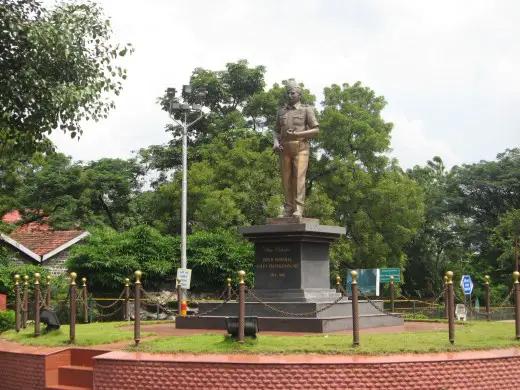Sam Manekshaw

| 7th Chief of the Army Staff, India | |
|---|---|
| In office 8 June 1969 – 15 January 1973 | |
| President | V. V. Giri Mohammad Hidayatullah |
| Prime Minister | (Indira Gandhi) |
| Preceded by | (General P. P. Kumaramangalam) |
| Succeeded by | (General Gopal Gurunath Bewoor) |
| 9th General Officer Commanding-in-Chief, Eastern Command | |
| In office 16 November 1964 – 8 June 1969 | |
| Preceded by | Lt Gen P P Kumaramangalam |
| Succeeded by | (Lt Gen Jagjit Singh Aurora) |
| 9th General Officer Commanding-in-Chief, Western Command | |
| In office 4 December 1963 – 15 November 1964 | |
| Preceded by | (Lt Gen Daulet Singh) |
| Succeeded by | (Lt Gen Harbaksh Singh) |
| 2nd General Officer Commanding, IV Corps | |
| In office 2 December 1962 – 4 December 1963 | |
| Preceded by | (Lt Gen Brij Mohan Kaul) |
| Succeeded by | (Lt Gen Manmohan Khanna) |
| Personal details | |
| Born | Sam Hormusji Framji Jamshedji Manekshaw 3 April 1914 Amritsar, Punjab Province, British India |
| Died | 27 June 2008 (aged 94) Wellington, Tamil Nadu, India |
| Resting place | Parsi Zoroastrian Cemetery, Ooty, Tamil Nadu, India |
| Spouse | (Silloo Bode) |
| Nickname | Sam Bahadur |
| Military service | |
| Allegiance | (British India) |
| Branch/service | (British Indian Army) Indian Army |
| Years of service | 1934 – 2008 |
| Rank | (Field Marshal) |
| Unit | 12th Frontier Force Regiment 8th Gorkha Rifles |
| Commands | Eastern ArmyWestern ArmyIV Corps26th Infantry Division Defence Services Staff College, Wellington The Infantry School167 Infantry Brigade |
| Battles/wars | (World War II) Burma campaign (Indo-Pakistan War of 1947) Sino-Indian War (Indo-Pakistan War of 1965 Second) Sino-Indian War – (1971 Indo-Pakistani War) |
| Awards | Recipient of the Padma Vibhushan, Padma Bhushan, Military Cross, and the Order of Tri Shakti Patta (First Class) |
| Service number | IC-14 |
The first Indian military officer to be promoted to the highest rank in the Indian Army, field marshal, was Sam Manekshaw, who was born in Amritsar, Punjab state, on April 3, 1914, and passed away in Wellington, Tamil Nadu state, on June 27, 2008. In addition to serving in World War II, the 1947 India-Pakistan War, and the 1965 India-Pakistan War, Manekshaw enlisted in the British Indian Army in 1934. He held the position of Chief of Army Staff from 1969 to 1973. Manekshaw was essential in India’s triumph during the 1971 India-Pakistan War, which spanned 13 days and culminated in the capitulation of Pakistani forces, leading to the establishment of an independent Bangladesh. Manekshaw received two of India’s most prestigious civilian awards: the Padma Bhushan in 1968 and the Padma Vibhushan in 1972. Besides his illustrious career and accomplishments, Manekshaw is renowned for his leadership efficacy, empathy for both his troops and adversaries, and his sharp wit.
Early Life
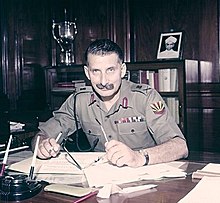
Sam Manekshaw was born on April 3, 1914, in Amritsar, Punjab, into a prominent (Parsi family) known for its rich cultural heritage and contributions to Indian society. The Parsi community is known for its contributions to Indian society, and Manekshaw’s upbringing in this environment instilled in him values of education and service.
Education
He completed his schooling at (Sherwood College in Nainital), where he excelled in sports and academics. He subsequently enrolled at Hindu (Sabha College in Amritsar), where he furthered his education and developed a strong foundation for his future endeavors. His early education laid a strong foundation for his leadership skills and character.
Military Aspirations
Manekshaw was inspired to join the military from a young age. He was influenced by the stories of bravery and valor from World War I and the Indian independence movement. In 1932, he was selected to join the (Indian Military Academy) (IMA) in Dehradun, where he was among the first cadets to be trained in the newly established institution.
Military Career
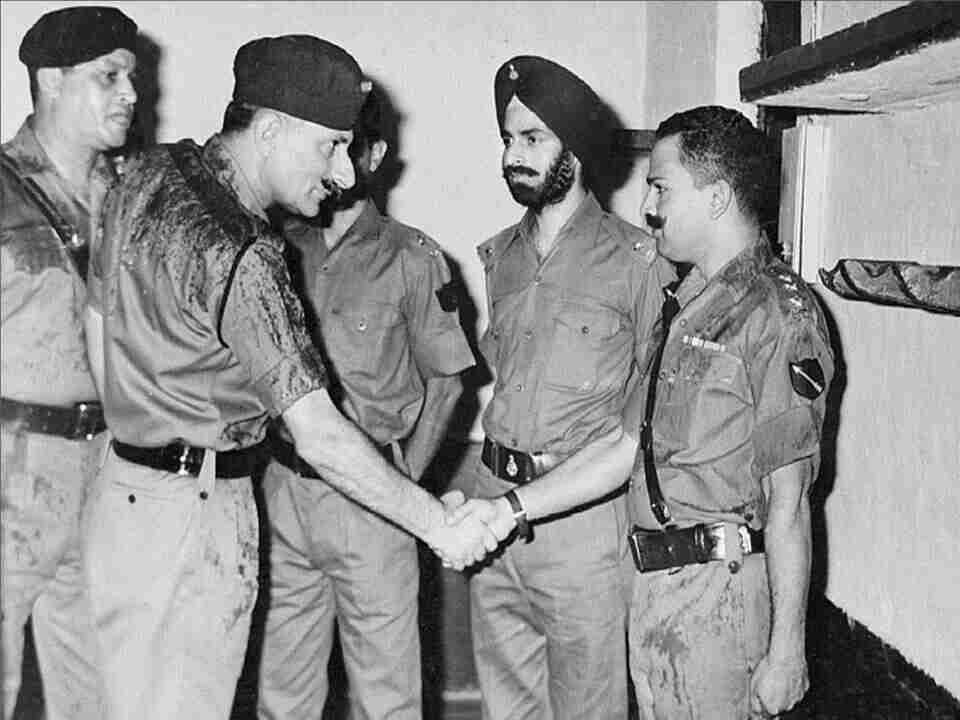
On December 13, 1934, Sam Manekshaw was commissioned as a second lieutenant in the British Indian Army, marking the beginning of a distinguished military career that would span nearly four decades. He served in various capacities, including in the 4th Battalion of the 12th Frontier Force Regiment.
World War II Service

Burma Campaign: During World War II, he served in the Burma Campaign against Japanese forces. His leadership during the Battle of Sittang Bridge in 1942 earned him the Military Cross for his bravery. He was responsible for the successful withdrawal of his battalion under heavy fire, showcasing his tactical acumen and courage.
Post-War Period: After the war, he continued to rise through the ranks and was involved in the reorganization of the army following India’s independence.
Partition of India: The Partition in 1947 brought significant challenges. Manekshaw was appointed as the General Officer Commanding of the Eastern Command, where he was responsible for managing the Refugee Crisis and ensuring the security of the eastern borders.
Key Military Roles and Achievements
Indo-Pakistani War of 1965:
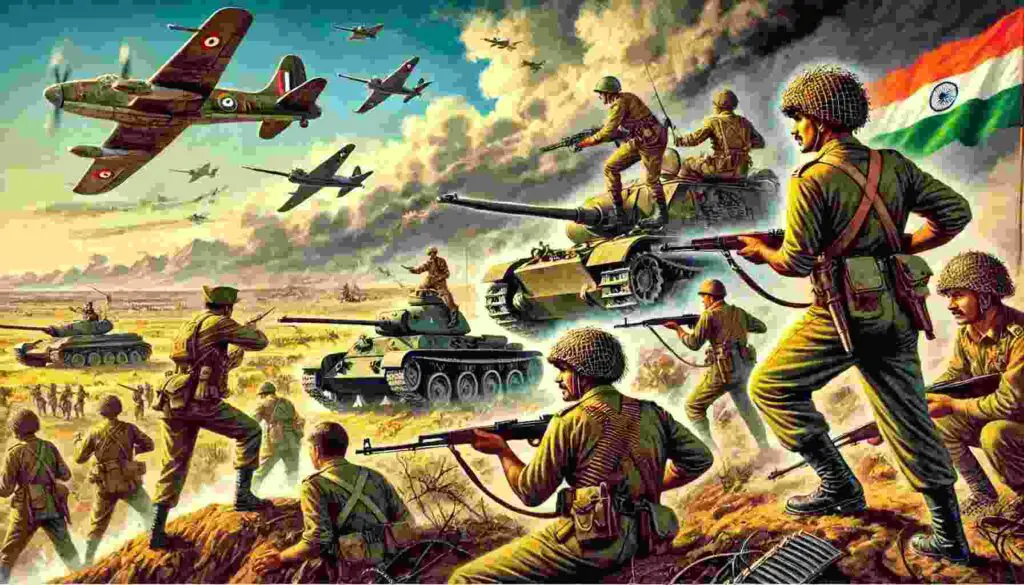
In the 1965 India-Pakistan war, General Sam Manekshaw played a key role as the Director of Military Operations. During the war, heavy fighting occurred along the Kashmir border, and Manekshaw was responsible for planning and carrying out military operations. Although the war ended in a stalemate, it provided the Indian Army with important lessons for future conflicts. The Indian Army gained valuable experience in dealing with challenges, which later helped in the 1971 war.
Appointment as Chief of Army Staff:
In 8 June 1969, Sam Manekshaw was appointed Chief of Army Staff of the Indian Army. This came at a time when the army needed significant changes to improve its effectiveness. The Indian Army required modernization, and Manekshaw was the right leader to guide these reforms.
Military Reforms:
As Chief of Army Staff, Manekshaw introduced several important reforms. He focused on improving training, discipline, and the equipment used by the army. These reforms helped make the army more prepared for any future challenges. Manekshaw also emphasized the welfare of soldiers and their families, which boosted the morale of the troops and improved their readiness. Thanks to his leadership, the Indian Army became stronger and better equipped to face any threats. These reforms played a crucial role in the success of the Indian Army in the 1971 war.
The 1971 Indo-Pakistani War
Background of the War:
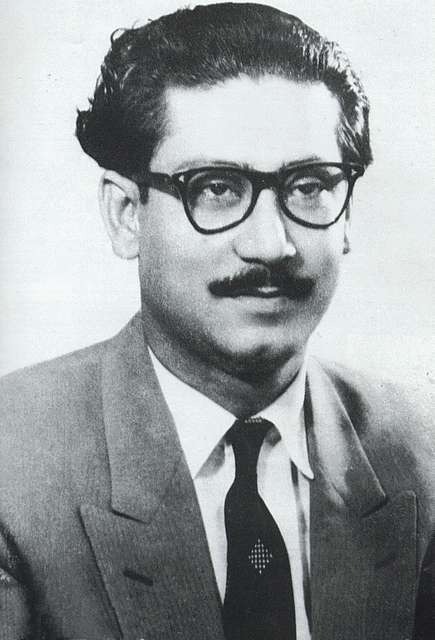
In 1970, a political crisis began in East Pakistan when the Awami League, led by (Sheikh Mujibur Rahman), won the elections with a clear majority. However, the government in West Pakistan refused to hand over power, leading to growing anger and frustration in East Pakistan. This decision created a divide, which resulted in tension between the two regions.
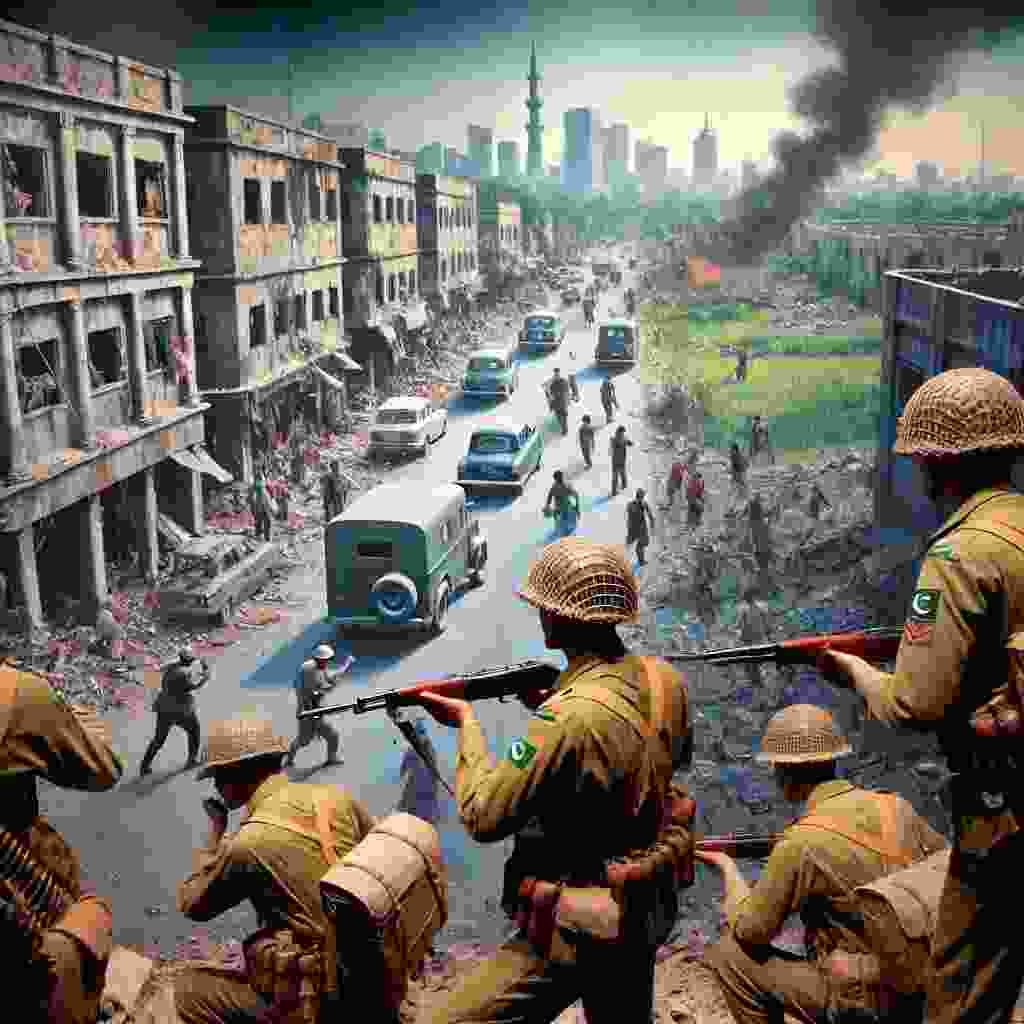
By March 1971, the situation worsened as the Pakistani army launched (Operation Searchlight), a brutal crackdown against the Bengali population. The military’s actions included mass killings, rapes, and widespread destruction, creating a humanitarian crisis. Many people fled to neighboring India to escape the violence, increasing the pressure on India.
During this time, General Sam Manekshaw, the Chief of the Indian Army, understood that military intervention was necessary to help the Bengali people and end the suffering. He supported the Mukti Bahini (the Bengali freedom fighters) and suggested that India assist them by providing training and supplies to fight against the Pakistani army.
At the same time, India also tried to get international support to put pressure on Pakistan, but when it became clear that diplomatic efforts were not enough, India decided to take military action. The Indian Army, under General Manekshaw’s leadership, launched a multi-front attack on Pakistan in December 1971.
With in 13 days, the (Indian Armed Forces) achieved a stunning victory, leading to the surrender of over 90,000 Pakistani troops and the creation of Bangladesh on December 16, 1971. This victory significantly enhanced India’s geopolitical standing in South Asia.

This led to the creation of (Bangladesh) on December 16, 1971, after Pakistan’s forces surrendered. The war also helped India strengthen its position in the region and marked a significant moment in the history of South Asia.
Promotion to Field Marshal
Field Marshal: In recognition of his exceptional leadership and contributions, Manekshaw was promoted to the rank of Field Marshal on January 1, 1973. This honor was a testament to his strategic brilliance and the respect he commanded within the armed forces.
Sam Manekshaw
” Sam Manekshaw served as the Chief of Army Staff of the Indian Army from 1969 to 1973, providing outstanding leadership. Under his command, the Indian Army won the 1971 war, leading to the creation of Bangladesh. He introduced reforms, improved training and equipment, and focused on the welfare of soldiers. His strategic thinking and leadership not only helped India win the war but also strengthened its political and geographical position. In 1973, he was honored with the rank of Field Marshal in recognition of his services “.
Personal Life
Marriage and Family
Sam Manekshaw married Silloo Bode, a fellow Parsi, in 1939. The couple had two daughters, (Shireen and Kalyani). He was known to be a devoted family man and often spoke about the importance of family in his life.
Personality
Manekshaw was renowned for his charisma, wit, and sense of humor. He maintained a close rapport with his officers and troops, earning their respect and admiration.
Later Years and Death
Retirement and Post-Retirement Life: After retiring from the army in 1973, Manekshaw remained active in public life. He served as a member of the Indian Parliament and was involved in various advisory roles.
Death
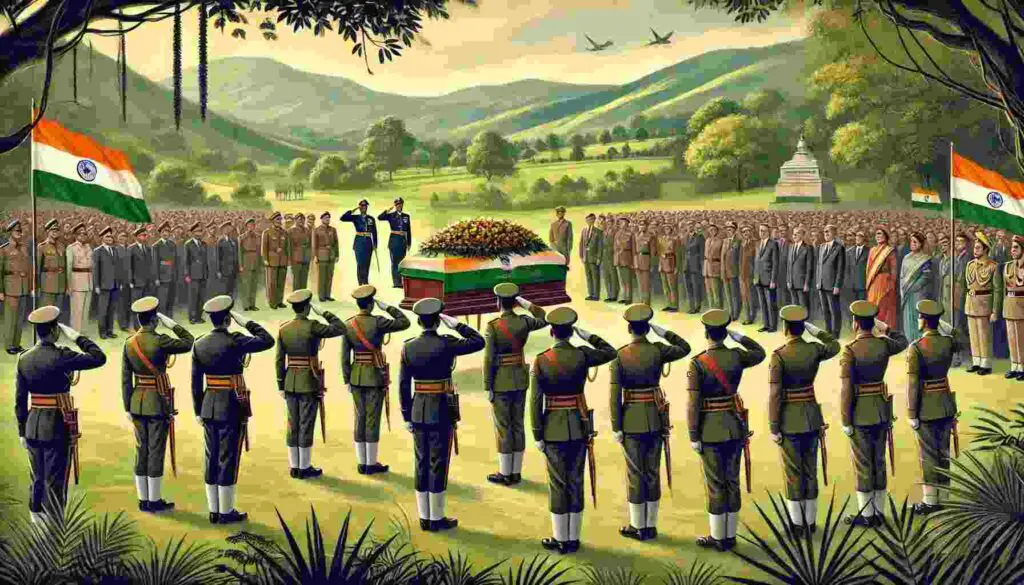
Field Marshal Sam Manekshaw passed away on June 27, 2008, in Wellington, Tamil Nadu, due to complications from pneumonia. His funeral was attended with full military honors, reflecting the respect and admiration he commanded throughout his life.
Awards and Honors
Manekshaw received numerous awards and honors, including the (Padma Bhushan) (1968) and (Padma Vibhushan) (1972). He was also honored with the Order of (Tri Shakti Patta) by the King of Nepal.
Cultural Impact:
His life and contributions have been depicted in various forms of media, including books and films. The 2023 biopic “Sam Bahadur,” featuring Vicky Kaushal, highlights his remarkable life and military career.
Influence on Military Doctrine
Manekshaw’s strategic insights and emphasis on the importance of morale and welfare within the armed forces have influenced military doctrine in India. His leadership and vision continue to inspire future generations of military leaders and civilians alike.
Field Marshal Sam Manekshaw remains an iconic figure in Indian military history, celebrated for his leadership, strategic brilliance, and commitment to the nation. His legacy endures, inspiring and motivating individuals across the nation.
More Information Click Here

